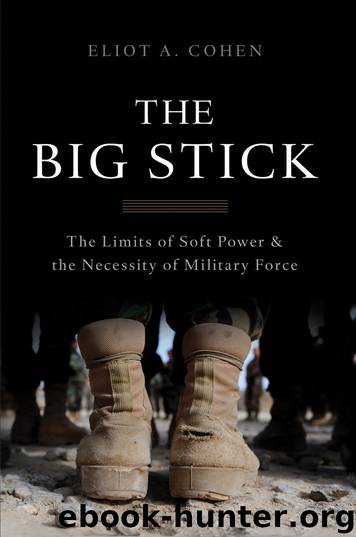The Big Stick: The Limits of Soft Power and the Necessity of Military Force by Eliot A. Cohen

Author:Eliot A. Cohen
Language: eng
Format: mobi
ISBN: 9780465096572
Publisher: Basic Books
Published: 2017-01-03T08:00:00+00:00
CHAPTER SIX
DANGEROUS STATES
China is, by virtue of its size, wealth, and aspirations, the great geopolitical challenger to the United States; the jihadists are, by their murderous convictions and practices, the most immediate threat. Only the former, by dint of its wealth, population, and rapidly growing military power, can challenge America’s status as the sole superpower. Only the latter are, at the moment, waging open war against the United States.
But a third strategic challenge emerges from a set of hostile states: Russia, Iran, and North Korea. They cooperate often, but are neither an axis nor a coalition. They have in common several features: authoritarian and lawless governments that rely on coercion to retain control and are therefore particularly threatened by liberal-democratic ideas; nuclear arsenals or nuclear aspirations; a high tolerance of risk; and willingness to use force in covert or disguised ways. The first two are revisionist powers, seeking to establish (or in their view, recover) international positions that they believe they have unjustly lost to the United States and its allies. The third is increasingly a loner, a client of China that finds itself neglected by its former patron, yet willing to undertake reckless acts to maintain or raise its status.
All three states are led by regimes predicated on opposition to the United States, a hostility that derives largely from their understanding of their recent past, be it the collapse of the Soviet Union, the defeat of Iran in its war with Iraq in the 1980s, or their isolation in the international system. Their hostility, rooted in an abiding and often irrational resentment, is unlike that of China, which reflects rather the antipathy of a rising power for a state that has dominated the international system. Nor does it resemble the animus of the jihadis, which is blind ideological hatred. In all three cases, to be sure, anti-Americanism is a genuine sentiment, but it is also a useful tool for repressive and even illegitimate regimes to maintain their hold over populations that might otherwise turn on their rulers for their own shortcomings. Because all three are, in essence, dictatorships, senior leaders are not easily replaced and, more important, are not likely to hear divergent views or robust policy disagreements. They are, in other words, susceptible to making very bad decisions. All three display a paranoid style in politics that makes them prone to misjudge both American behavior and the nature of the outside world. These are dangerous states, and dangerous not only by virtue of how they understand their own interests, but how they interpret the actions of others.
The word rogue, often used to describe these governments, is misplaced. These are not, from the point of view of international politics, outlaw regimes—they have normal interstate relationships with many nations. Nor is it indeed possible to isolate them very much. India, for example, is friendly to the United States, yet wishes nonetheless to have good relations with Iran not only to secure oil supplies but also because of deep cultural connections, the strength of which the United States cannot ignore.
Download
This site does not store any files on its server. We only index and link to content provided by other sites. Please contact the content providers to delete copyright contents if any and email us, we'll remove relevant links or contents immediately.
| Arms Control | Diplomacy |
| Security | Trades & Tariffs |
| Treaties | African |
| Asian | Australian & Oceanian |
| Canadian | Caribbean & Latin American |
| European | Middle Eastern |
| Russian & Former Soviet Union |
The Secret History by Donna Tartt(19053)
The Social Justice Warrior Handbook by Lisa De Pasquale(12187)
Thirteen Reasons Why by Jay Asher(8894)
This Is How You Lose Her by Junot Diaz(6877)
Weapons of Math Destruction by Cathy O'Neil(6267)
Zero to One by Peter Thiel(5787)
Beartown by Fredrik Backman(5737)
The Myth of the Strong Leader by Archie Brown(5500)
The Fire Next Time by James Baldwin(5431)
How Democracies Die by Steven Levitsky & Daniel Ziblatt(5216)
Promise Me, Dad by Joe Biden(5144)
Stone's Rules by Roger Stone(5081)
A Higher Loyalty: Truth, Lies, and Leadership by James Comey(4954)
100 Deadly Skills by Clint Emerson(4921)
Rise and Kill First by Ronen Bergman(4780)
Secrecy World by Jake Bernstein(4741)
The David Icke Guide to the Global Conspiracy (and how to end it) by David Icke(4709)
The Farm by Tom Rob Smith(4502)
The Doomsday Machine by Daniel Ellsberg(4484)
